16 voices on abortion access for victims of gender-based violence
One in three women worldwide experiences gender-based violence. In honor of the 16 Days of Activism against Gender-Based Violence—which runs from the International Day for the Elimination of Violence against Women (November 25) to Human Rights Day (December 10)—here are 16 voices which highlight the importance of safe abortion access for survivors of gender-based violence. Explore to learn about Ipas’s research on gender-based violence, the experiences of Rohingya refugees living in camps in Bangladesh, why training police on victims’ rights is essential, and more.

Erin Pearson
Researching the impact of gender-based violence on reproductive health

Erin Pearson: Researching the impact of gender-based violence on reproductive health
 Two recent Ipas-led studies conducted in Bangladesh investigated the influence that intimate partner violence has on reproductive outcomes among women seeking abortion and on women’s decision-making about postabortion contraception. Here, Ipas Senior Researcher Erin Pearson, who co-led the studies, highlights what surprised her about the studies and the role that gender-based violence plays in women’s need to access reproductive health care.
Two recent Ipas-led studies conducted in Bangladesh investigated the influence that intimate partner violence has on reproductive outcomes among women seeking abortion and on women’s decision-making about postabortion contraception. Here, Ipas Senior Researcher Erin Pearson, who co-led the studies, highlights what surprised her about the studies and the role that gender-based violence plays in women’s need to access reproductive health care.
What surprised you about the two studies you led in Bangladesh about how intimate partner violence influences reproductive health?
The biggest surprise was how resourceful many women are in the face of these difficult situations. Our studies have been with women who are accessing MR/PAC services in health facilities, and as a result, we are working with a more visible, more empowered group of women who are accessing health services. These women shared a variety of coping strategies they use to regain their reproductive autonomy in the face of violence. We are now working on an intervention that will counsel all MR/PAC clients on strategies to cope with reproductive coercion that they can use themselves and/or share with other women.
How big of a role does gender-based violence play in women’s need to access reproductive health care?
Research from various contexts, including one of our studies in Bangladesh, has shown that gender-based violence is associated with poor reproductive health outcomes, including unsafe abortion. Women experiencing violence may have less mobility, access to resources, and decision-making authority than women not experiencing violence, which makes accessing health facilities difficult. Our research has also shown that reproductive coercion can be used as a form of control to tie a woman into a family or keep her in a more dependent position. Women experiencing violence often have a great need and desire for reproductive health care, but have a difficult time accessing high-quality care.

Eliana Olaizola
Tackling child pregnancy in Mexico
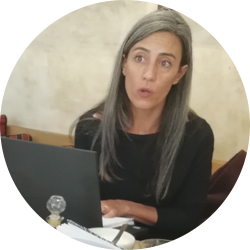
Eliana Olaizola: Tackling child pregnancy in Mexico

“Early pregnancy is not usually caused by adolescents having consensual sexual relationships, but rather is the result of girls and adolescents being coerced by adult men into having sex through physical force, extortion, manipulation and threats,” says former Ipas Mexico Director Eliana Olaizola, explaining the findings of a recent study her team released.
The study, “Sexual violence and child pregnancy in Mexico: A public health and human rights problem,” found that sexual violence is a significant cause of pregnancies in Mexican girls ages 10-14. And girls facing pregnancy as the result of sexual violence are at high risk of resorting to unsafe abortion, which is the third leading cause of maternal death in Mexico. The study recommends that Mexico’s government implement national protocols for sexual and reproductive health services that are youth-friendly, focus on identifying sexual violence cases, and offer access to safe, legal abortion. It also recommends educating girls and adolescents on how to seek care for sexual violence and unwanted pregnancy.
“For Mexico to reach the goals on gender equity and sexual and reproductive health set forth in the 2030 Agenda for Sustainable Development—as well as the country’s national commitment to eradicate pregnancy in girls younger than 15—specific actions will be necessary,” Olaizola says.

Cecilia Espinoza
Sexual violence violates human rights
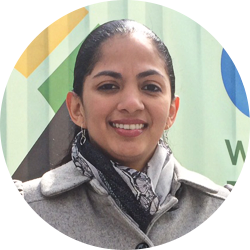
Cecilia Espinoza: Sexual violence violates human rights

“To fully protect the human rights of adolescent girls and young women, we must prevent sexual violence and unwanted pregnancy,” says Cecilia Espinoza, Ipas senior advocacy advisor.
Girls and young women experience higher rates of sexual violence than adult women, contributing to their higher risk of unintended pregnancy and unsafe abortion. That’s why Ipas advocates for policies that help young people deal with the consequences of sexual violence without requiring third-party consent and with full respect for their privacy. This Ipas factsheet on protecting the human rights of girls and young women lists six actions governments and policymakers can take to help protect youth from sexual violence.
Another key action: work to provide youth with comprehensive sexuality education that addresses gender norms, helps prevent sexual violence and includes information on how to access emergency contraception and safe abortion. “It’s essential that young people have information about abortion, understand the laws and policies in their context, and know how to access safe services,” Espinoza says.

Dr. Samuel Otu-Nyarko
‘Police in every country should have training in gender-based violence’
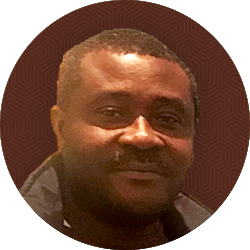
Dr. Samuel Otu-Nyarko: ‘Police in every country should have training in gender-based violence’

Deputy Police Commissioner Dr. Samuel Otu-Nyarko is head of the Ghana Police Public Health Department and has been a key partner in Ipas Ghana’s work with the Ghana Police Service to sensitize, train and cultivate the support of police on abortion-related issues.
In this Q & A with Ipas, he discusses the role of police in protecting the health and human rights of victims of gender-based violence.
When women who are victims of violence seek help from police, officers’ responses do not always protect women’s health and human rights. What do police officers need to be able help women who have suffered violence and may be experiencing unwanted pregnancy?
There are instances when police do not take the needs of victims seriously enough and do not offer prompt attention. However, officers who are well-trained do offer the desired help—and the capacity of police to provide this help can be increased by training through workshops, briefings and other forums. This can help victims avoid unwanted pregnancies by accessing emergency contraception if their case is reported early enough. If a victim has become pregnant and wants to terminate the pregnancy, the laws of Ghana provide for legal abortion in cases of rape.
How has the Ghana Police Service been trained to help women who experience gender-based violence?
We have a dedicated unit for handling domestic violence issues, which is called the domestic violence and victims support unit (DOVVSU). These officers are trained to handle gender-based violence and human trafficking issues.
What advice do you have for your counterparts in other countries regarding police response to gender-based violence?
Police in every country should have gender-based violence desks, with personnel specially trained to handle such issues. Hospitals, nongovernmental organizations and community-based organizations should be included as key stakeholders. And issues related to gender-based violence must be raised at the national level at every opportunity.
Anything else you want to say about the role of police and the link between gender-based violence and the need for abortion care?
The police are mandated by law to investigate, prosecute and prevent gender-based violence. We are working to raise the public awareness of both men and women on GBV through sensitization programmes on TV and radio, and by reaching out to youth groups, religious organizations and other community groups. It’s important for everyone to understand that, when gender-based violence is reported promptly, victims can legally access medical care, including emergency contraception and safe abortion.

Hauwa Shekarau
‘There is no need to be ashamed’
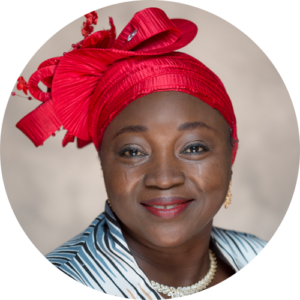
Hauwa Shekarau: ‘There is no need to be ashamed’
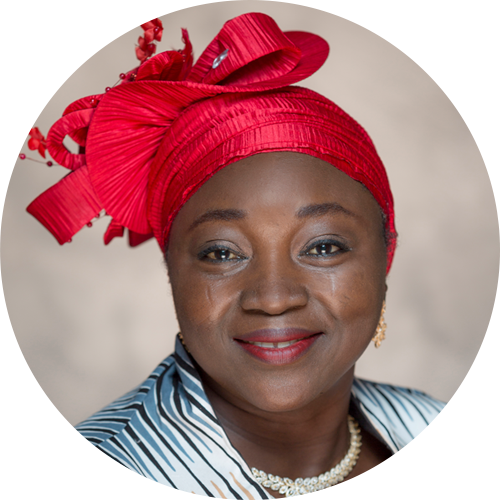
In Nigeria, where nearly 30 percent of women have experienced physical violence by the age of 15, former Ipas Nigeria Country Director Hauwa Shekarau is raising her voice on the issue of gender-based violence.
At a screening of the movie series “AKACHI” in Abuja earlier this year, Shekarau said victims often are afraid to seek help because of the stigma associated with rape and other types of violence against women. But, she said, “I am calling on victims to speak up and seek help, because it is not okay if you are being abused or assaulted and there is no need to be ashamed or embarrassed about it.”
Ipas Nigeria is partnering with other nongovernmental organizations in Nigeria to fight violence against women and is urging the government to step up its fight against domestic and sexual violence. In this short video clip, Shekarau and others talk about the scope of the problem in Nigeria, saying “we cannot afford to be silent.”

Noor
‘That is why we left’
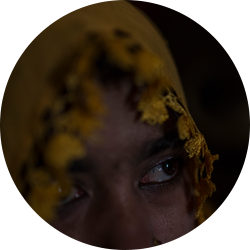
Noor: ‘That is why we left’

“The military was killing us, shooting us, and women were being raped. That is why we left,” says Noor (a pseudonym), recalling the day the brutal wave of violence directed at the Rohingya community reached her village in Myanmar.
As she fled her home with her son, three men from the military detained them. Then one of the men violently raped her, in front of her son. But she and her son managed to escape. After walking 10 days to reach Bangladesh, they settled in the refugee camps there, where she discovered she was pregnant. She wanted to end the pregnancy, because she felt it would be a sin to bring a rapist’s child into the world.
Reproductive health services are often minimal or nonexistent in refugee camps and other crisis settings. Watch this video to learn how Noor was able to safely end her unwanted pregnancy at a health facility in the camps staffed by Ipas-trained providers crisis settings.
Photo and video © Farzana Hossen

Marta María Blandón
We must end ‘forced motherhood’
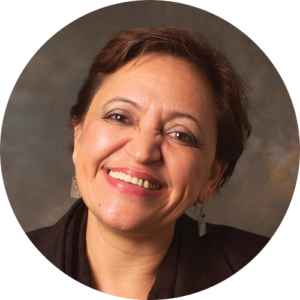
Marta María Blandón: We must end ‘forced motherhood’
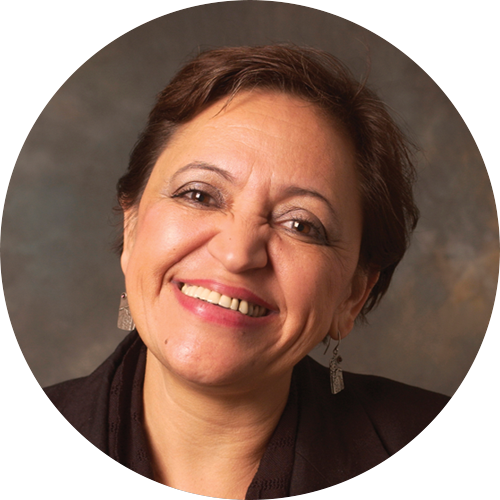
“I believe women do not deserve to be forced into motherhood by an act of violence,” says former Ipas Central America Director Marta María Blandón. (Watch her talk more about this in the video below.)
In 2006, Nicaragua’s government enacted a total abortion ban, endangering the lives of women and girls and forcing those with unwanted pregnancies to carry them to term against their will or seek clandestine and often unsafe abortions. One tragic result of the ban has been a surge in girls becoming mothers as a result of sexual violence and no access to a safe abortion. In 2016, to mark 10 years since the abortion ban, Blandón’s team released a study with sobering statistics: Every year approximately 6,750 girls between ages 10-14 are victims of sexual violence, and 1,300 become pregnant.
“To prevent further suffering by girls with pregnancies forced by rape, it’s urgent that the law permit the option of abortion,” Blandón wrote in the study’s introduction. Ipas and partners continue advocating for a repeal of the abortion ban—and to combat the high rates of sexual violence affecting girls and young women across the country and the region.

Fatima
‘I didn’t want to keep a rapist’s baby’
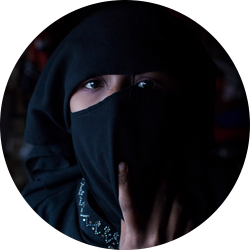
Fatima: ‘I didn’t want to keep a rapist’s baby’

Fatima (a pseudonym) was 17 years old, newly married and living in Myanmar, when she and her husband went to visit her mother. While they were sleeping, the military arrived in the village. Fatima woke to panic and was surrounded by attackers who assaulted her. They took her and roughly 10 other women to a school and kept them there for days, repeatedly beating, torturing and raping them. One day while they were away, the girls fled.
Fatima returned to her house, but everything was burned and deserted. She walked through the hills and met a neighbor family, who had managed to hide. They fled to Bangladesh and now live in a refugee camp. Fatima heard that her husband and her mother were killed. Her siblings are alive, though she has not been able to find them. When she found out she was pregnant, the neighbor family took her to visit a doctor at a facility trained by Ipas staff. She took menstrual regulation pills to terminate her unwanted pregnancy.
“I didn’t want to keep a rapist’s baby, so I took the medicine to terminate the pregnancy.”
Photo © Farzana Hossen

Roberta Yucra
Women miners face high rates of violence
Roberta Yucra: Women miners face high rates of violence
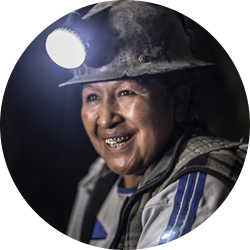
“To be able to lead my sisters, that’s my role … to empower them to achieve our rights together,” says Roberta Yucra, a Bolivian miner and abortion rights advocate.
A fearless leader, Yucra has forged a career in the mining industry—where only 30% of the workforce are women. Women miners face high rates of gender-based violence, unintended pregnancy and unsafe abortion. Trainings with Ipas Bolivia on sexual and reproductive health and rights allowed Yucra to educate her coworkers and talk openly about the dangers of unsafe abortion. While abortion is legal in Bolivia in cases of rape, incest and risk to a woman’s health or life, abortion-related stigma and lack of knowledge of the law pose formidable barriers for sexual violence victims who seek to end unwanted pregnancies. Education is therefore key to empowering women to exercise their rights.
In Bolivia, a grassroots movement for safe, legal abortion has been building for many years, harnessing the power of leaders from across the country’s diverse population—which has more than 30 indigenous groups. You can read more about these leaders, including Yucra, and how their tireless efforts are bringing Bolivia ever closer to expanding legal access to abortion.
Photo by Ariel Duranboger

Tigist
‘That is why I need the abortion’
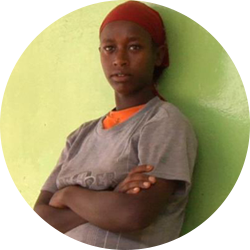
Tigist: ‘That is why I need the abortion’

Tigist was living in Sheshamane region of Ethiopia when a man raped her in the tea room where she was working. She was young and had no one to support her. “That is why I needed the abortion,” she says.
Prior to 2005, abortion was legal in Ethiopia only to save the life of a woman or protect her physical health. Unsafe abortion was one of the leading causes of women dying from pregnancy-related complications.
The abortion law was expanded in 2005, making abortion legal in cases of rape, incest, fetal impairment and under other conditions. Even so, Tigist had difficulty navigating the health system as she traveled first to a clinic, and then a hospital, to get abortion care.
This short film, an adaption of the 2013 documentary “Not Yet Rain,” captures the voices of Tigist and another young woman on their journey to get safe, legal abortion care. “What we want is … to be careful for ourselves, and just live,” they say.
Ethiopia has made significant progress in improving access to safe abortion services. Still, unsafe abortion persists. Ipas Ethiopia is working closely with the Ministry of Health and other partners to establish safe abortion services and to create reproductive health networks that connect women with care.

Farzana Hossen
‘They don’t want to share what happened to them’
Farzana Hossen: ‘They don’t want to share what happened to them’
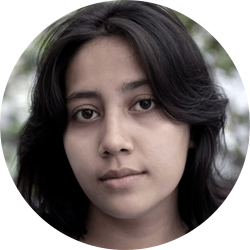
Since August 2017, around 700,000 Rohingya have fled Myanmar for Bangladesh and more continue to seek refuge every day. They are living in registered or makeshift refugee camps. There have been “horrific” accounts of rape and sexual assault against Rohingya women and girls fleeing Myanmar. Thousands of the women and adolescent girls now living in the camps in Bangladesh are pregnant. They have acute reproductive health needs—and beyond that, every woman and girl in these camps has reproductive health needs. Yet, in such crisis settings, those services are often minimal or nonexistent.
Earlier this year, Ipas commissioned the photographer Farzana Hossen to document the experiences of the women and girls living in the camps. Here, Farzana describes the damaging effect of stigma about rape:
“One woman couldn’t flee with her family when the military came—she was pregnant and couldn’t run. She was brutally raped, found senseless and bleeding. After, her husband wanted to leave her because she had been raped. She told me, ‘I was lucky that my mother-in-law is my own aunt. She helped my husband understand that it wasn’t my fault. She asked him to stay with me for our children. He accepts me, but our relationship is not the same. His negligence hurts me.’ Often, women are afraid to lose their families and they don’t want to share what happened to them.”

Young survivors
Forced motherhood is the only option in Nicaragua
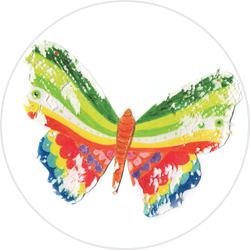
Young survivors: Forced motherhood is the only option in Nicaragua

“When I was in pain, they told me not to worry because I’m not the only one to have experienced this, and that those in the government had seen various girls smaller than me go through this, and that I had a body strong enough to have my baby,” recounts a girl from Managua, Nicaragua, who became pregnant as the result of rape when she was younger than 15. Due to the country’s total abortion ban, she had no choice but to become a mother—or else seek out a clandestine and likely unsafe abortion.
Every year in Nicaragua, approximately 6,750 girls between ages 10-14 are victims of sexual violence, and 1,300 become pregnant. Without access to safe, legal abortion, these girls face forced motherhood instead of continuing their education and following their dreams. Widespread social acceptance of early pregnancy and tolerance of sexual violence only make it harder for young victims to speak out about what happened to them or even pursue options like adoption. Instead, many carry their pregnancies to term, feeling shamed and stigmatized by their family, community and even health providers. They also face a higher risk for pregnancy-related health complications—including death—due to pregnancy at such a young age.
Ipas Central America released a study in 2016 detailing the epidemic of “child mothers” that has resulted from Nicaragua’s total abortion ban. Alongside it they released a collection of testimonials (only available in Spanish) from girls interviewed for the study. In it, one girl recounts: “At the doctor visits they gave me my pills. The doctors didn’t say anything to me. They measured my belly, they weighed me… They only told me not to kill the baby because babies aren’t guilty. My mother spoke for me. Sometimes I didn’t want to talk.”
Ipas Central America and partners in Nicaragua and across the region continue to advocate for a repeal of the total abortion ban to protect the health, lives and human rights of women and girls—including sexual violence survivors.

Dr. Delwara Akhtar
‘I wanted to help’
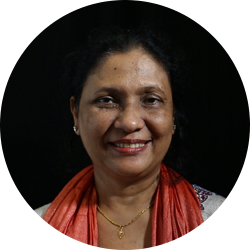
Dr. Delwara Akhtar: ‘I wanted to help’

“Seeing how little girls had been raped and had been forced to flee their country was so disheartening. I wanted to help, and thank God, I got that opportunity,” says Dr. Delwara Akhtar of Ipas Bangladesh.
She is one of several Ipas trainers working to improve access to reproductive health services in the Rohingya refugee camps in Bangladesh, where more than 700,000 Rohingya fleeing violence in Myanmar are now living. Many are women and girls who have been victims of rape and other forms of gender-based violence and are in desperate need of basic health services, including reproductive health care.
Responding to that need, Ipas Bangladesh is working with the government and partners to train doctors, midwives and paramedics in the provision of menstrual regulation (as abortion is known in Bangladesh) and treatment for complications of unsafe abortion. In this short video, you will hear from Dr. Akhtar and other trainers and providers. “In this situation of war and genocide, we have been able to make a contribution with our services,” says Akhtar.
Photo and video © Farzana Hossen

Kristen Shellenberg
‘The stigma is compounded’
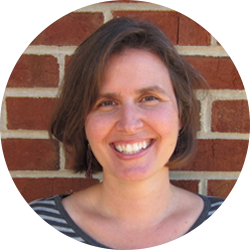
Kristen Shellenberg: ‘The stigma is compounded’

Dr. Kristen Shellenberg, Ipas senior research scientist, is an expert on abortion-related stigma and was instrumental in the development of SABAS (the stigmatizing attitudes, beliefs and actions scale), a tool used to measure abortion stigma at the individual and community level.
In the Q & A below, she discusses the multiple layers of stigma faced by those who want to terminate a pregnancy resulting from sexual violence.
Is there stigma associated with the experience of rape and other types of gender-based violence (GBV)?
Yes, because women who experience GBV are often blamed for having caused the violence themselves—ostensibly because of their behavior, the type of clothing they were wearing or some other action on their part. They are treated as though they could somehow have prevented the violence from happening, and this causes them to feel guilt and shame.
And what about women who find themselves with an unwanted or unintended pregnancy? Is there stigma involved there as well?
There is. They may feel shame and guilt for not having prevented they pregnancy in the first place. And they may feel even more shame and guilt if they decide to have an abortion. The stigma is compounded for those who have experienced sexual violence that results in a pregnancy and want to terminate that pregnancy.
How does this affect their ability to get a safe abortion?
The effect is negative. The stigma they perceive, experience or internalize may keep them from seeking safe, timely abortion care—especially if they feel like they have to divulge their GBV experience in order to get an abortion. So the stigma both puts their mental and physical well-being at risk and creates an additional barrier to safe care.
What is the message for those like yourself who are fighting to expand access to safe abortion?
It’s that we must redouble our efforts. Breaking down the barriers created by stigma is critical for ensuring that people who suffer gender-based violence get the respectful abortion care they need and deserve.

Malena Morales
Training police on victims’ rights is essential
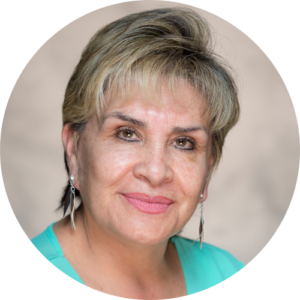
Malena Morales: Training police on victims’ rights is essential
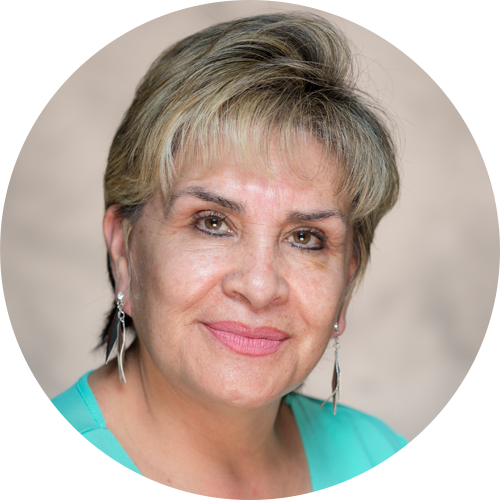
“Women in Bolivia who have experienced sexual violence and wish to obtain a legal abortion must file a police report, and this means they’re vulnerable to police staff as well as health staff misinforming them about their rights,” says Ipas Bolivia Director Malena Morales.
In partnership with Bolivia’s Ministry of Justice, Ipas trains law enforcement, judicial and policy professionals on the legal provisions for abortion and guidelines for handling cases in which women seek abortion care. Abortion is legal in cases of rape, incest and risk to a woman’s health or life, but many professionals who could facilitate women’s access to this legal service still do not have training on the law and end up creating barriers for women.
“Personnel in the police, judicial and health sectors are not informed about the 2014 court ruling which guarantees women the right to an abortion,” Morales explains. Ipas also worked with the government to create guidelines for the care of sexual violence victims. The guidelines explain the legal obligations of institutions involved with sexual violence cases to guarantee victims’ right to sexual and reproductive health care, including the right to choose emergency contraception or safe, legal abortion.

Anu Kumar
‘Access to safe abortion is critical’
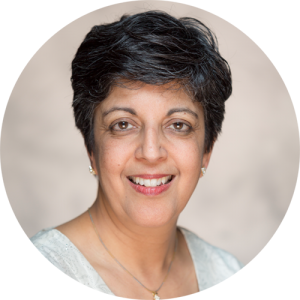
Anu Kumar: ‘Access to safe abortion is critical’
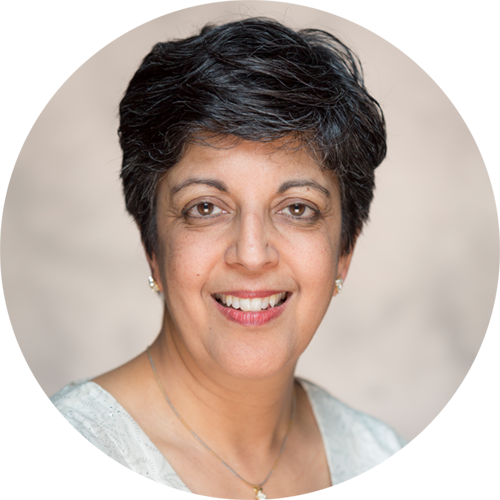
With one in three women worldwide experiencing sexual or physical violence at some point in their lives, Ipas is stepping up efforts to make safe abortion and contraception available to victims of gender-based violence.
A major focus, says Ipas President and CEO Anu Kumar, is partnering with relief agencies to expand access to reproductive health services in humanitarian settings, where women and girls are at even greater risk of sexual violence. “Access to safe abortion is critical in those settings,” she says.
In Bangladesh, Ipas is working with the government and partners to bring reproductive health care to the Rohingya refugee camps. Since August of 2017, Ipas has helped to train doctors, midwives and other health professionals in the provision of contraception, postabortion care and menstrual regulation (as abortion is known in Bangladesh). Those services are now available at 37 health facilities in the camps. The availability of safe services has averted an estimated 5,000 unsafe abortions, and more than 12,000 women and girls have received contraceptive care.
“For many women and girls in such settings,” Kumar says, “sexual harassment and violence are daily facts of their lives. It may not be visible to others, but, to them, the violence may occupy center stage in their mental and emotional lives. As the number of women and girls in refugee camps continues to grow, we are determined to work harder than ever to protect their basic human rights, which includes access to safe abortion care.”

